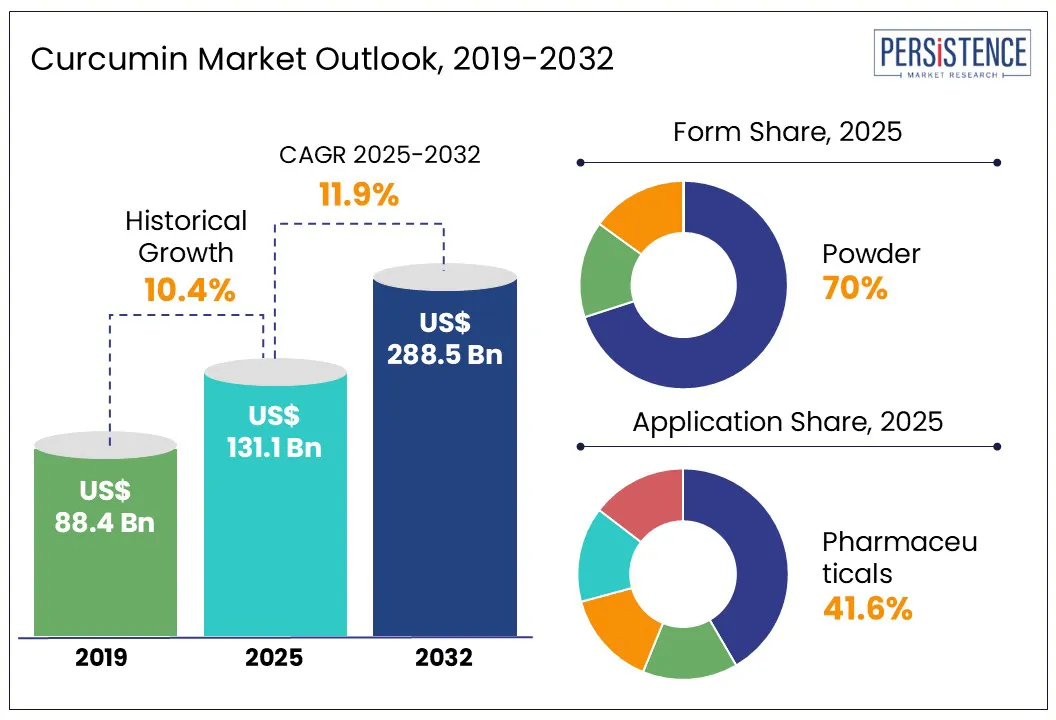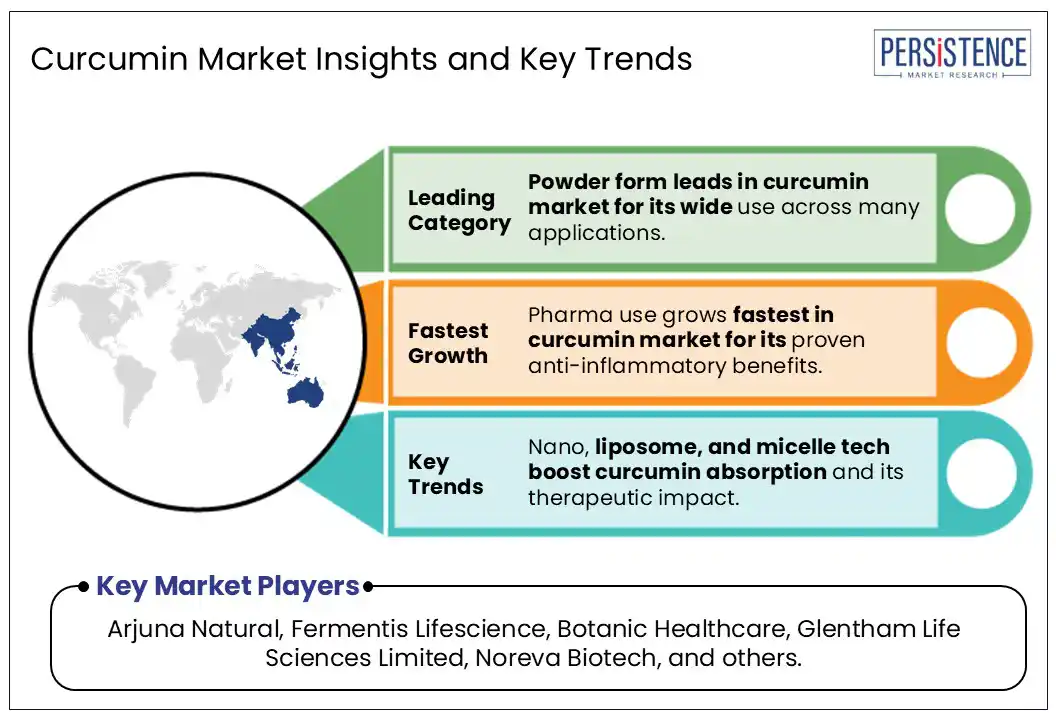ID: PMRREP35443| 189 Pages | 24 Jun 2025 | Format: PDF, Excel, PPT* | Food and Beverages

The global curcumin market size is projected to grow from US$ 131.3 billion in 2025 to US$ 288.5 billion by 2032, growing at a CAGR of 11.9% during the forecast period.
According to Persistence Market Research, the curcumin industry is experiencing significant growth, largely due to the increased consumer awareness of the health benefits of turmeric and its active compound, curcumin. Known for its anti-inflammatory, antioxidant, and therapeutic properties, curcumin is widely used in dietary supplements, functional foods, beverages, cosmetics, and pharmaceuticals. As consumer interest in natural and plant-based health solutions rises, curcumin is incorporated into a variety of product categories, including health supplements and skincare formulations. The market is further supported by the expanding applications of curcumin in traditional medicine, particularly in Asia Pacific, where Ayurvedic practices are deeply embedded in culture.

Key Industry Highlights
|
Global Market Attribute |
Key Insights |
|
Curcumin Market Size (2025E) |
US$ 131.3 Bn |
|
Market Value Forecast (2032F) |
US$ 288.5 Bn |
|
Projected Growth (CAGR 2025 to 2032) |
11.9% |
|
Historical Market Growth (CAGR 2019 to 2024) |
10.4% |
The global adoption of curcumin is driven by the rising awareness of its potent anti-inflammatory and antioxidant properties. Increasingly recognized for its ability to combat inflammation and oxidative stress, curcumin is incorporated into health supplements, functional foods, and cosmetic products. As consumers seek natural alternatives for managing chronic conditions such as arthritis, cardiovascular diseases, and skin aging, curcumin’s prominence is growing. The expanding body of research supporting its therapeutic benefits is facilitating its integration into various wellness applications significantly boosting demand.
The curcumin market faces a restraint due to the rising adoption of synthetic antioxidants and anti-inflammatory agents, which are increasingly being preferred over natural alternatives such as curcumin. Synthetic compounds, such as butylated hydroxytoluene (BHT) and ibuprofen are often chosen for their stability, higher potency, and lower cost, especially in pharmaceutical and food applications.
These synthetic alternatives are more widely available and have established efficacy, leading manufacturers to opt for them instead of curcumin. Synthetic compounds do not face the bioavailability issues associated with curcumin, making them more attractive to industries requiring consistent and predictable performance. As a result, the reliance on curcumin-based products is being reduced, creating a challenge for curcumin producers who must innovate to maintain their market position and address the growing competition from synthetic alternatives.
The development of advanced curcumin formulations with enhanced absorption is being recognized as a key opportunity in the global industry. Technologies such as nanoparticles, liposomes, micelles, and phospholipid complexes significantly improve curcumin's bioavailability enabling more effective absorption and enhanced therapeutic impact in addressing inflammation, oxidative stress, and chronic diseases. With rising demand for natural, high-efficacy supplements, these innovative delivery systems are increasingly adopted in pharmaceutical and nutraceutical applications, thereby expanding curcumin’s commercial potential.
The powder form has been established as the dominant segment in the curcumin market due to its broad compatibility across diverse applications. Favored for its ease of formulation, extended shelf life, and superior dispersion, powdered curcumin is widely used in dietary supplements, functional foods, beverages, and pharmaceuticals. Its ability to integrate seamlessly without significantly altering product taste or consistency, along with flexible dosing and cost-effectiveness, has made it the most widely adopted format globally.
Silverline Chemicals, an Indian manufacturer offering Curcumin Extract 95% Powder USP/BP, a standardized product containing at least 95% curcuminoids. This high-purity extract is used extensively in pharmaceuticals, nutraceuticals, and cosmetics for its powerful anti-inflammatory and immune-supporting properties. Silverline’s focus on product quality and therapeutic efficacy reinforces the preference for powdered curcumin across the industry, highlighting its versatility and effectiveness in large-scale and multifunctional applications.
The pharmaceutical application segment is recognized as the leading contributor to the curcumin market due to its scientifically validated anti-inflammatory and antioxidant properties. Curcumin is increasingly incorporated into pharmaceutical formulations for managing chronic diseases such as arthritis, metabolic syndrome, and neurodegenerative disorders. Its ability to modulate inflammatory pathways and combat oxidative stress has led to its integration into various therapeutic products. Advancements in delivery systems that improve bioavailability have facilitated the formulation of curcumin into tablets, capsules, and topical preparations, making it a preferred natural ingredient in pharmaceuticals.
In March 2025, a study published in the Journal of Research in Pharmacy explored curcumin-loaded PLGA-Tf nanoparticles for targeted brain drug delivery. It focuses on improving curcumin's availability in the brain to manage Parkinson’s disease by overcoming low solubility and permeability challenges. This innovation underscores the pharmaceutical industry's commitment to leveraging curcumin’s therapeutic potential.

The curcumin market is shaped by growing consumer demand for natural, plant-based health solutions and clean-label products in North America. Driven by increased awareness of turmeric’s health benefits, curcumin is widely adopted in dietary supplements, functional foods, and beverages. The shift away from synthetic ingredients, coupled with rising interest in holistic wellness practices targeting inflammation and oxidative stress, has significantly boosted curcumin adoption across the region.
In Europe, the curcumin market is being significantly driven by a rising emphasis on herbal medicine and strengthened regulatory support for natural health products. As consumer preferences shift toward plant-based therapies, curcumin is increasingly valued for its anti-inflammatory and antioxidant benefits. Regulatory frameworks across Europe have become more favorable, streamlining the approval process for herbal supplements, fostering product innovation, and ensuring consumer safety. This has led to accelerated adoption of curcumin in health and wellness applications.
The expansion of Ayurveda and traditional medicine industries is significantly driving the development of curcumin-based products. With increasing traction in countries such as India and China, curcumin is being incorporated into a wide range of formulations, including herbal supplements, skincare products, and functional foods. Its health benefits, rooted in centuries of traditional use, are spurring innovation supported by favorable regulatory frameworks that encourage the adoption of natural remedies.
In 2023, Herbalife’s launch of Immunoturmeric in Indonesia demonstrates how traditional knowledge can be integrated with modern technology. To address curcumin’s low water solubility and limited bioavailability, Herbalife used nanotechnology to convert curcumin extracts into nanoparticles, enhancing absorption and efficacy. The raw materials are sourced from turmeric farmers in Central Java, Indonesia, underscoring the synergy between local traditional practices and advanced scientific methods. This approach is reinforcing curcumin’s role in the region’s rapidly growing wellness and nutraceutical sectors.
The global curcumin market is highly competitive, with key players emphasizing product innovation, quality improvement, and strategic partnerships to enhance their market presence. Leading companies dominate the market by offering a diverse range of high-quality curcumin extracts, including bio-enhanced formulations designed to improve bioavailability. These companies frequently invest in research and development to maximize the therapeutic potential of curcumin, addressing the growing demand for functional foods, beverages, and nutraceuticals.
Emerging companies are also making significant advances by introducing novel curcumin products that prioritize clean-label ingredients and sustainability. Collaborations with academic institutions and partnerships within the healthcare industry are becoming more common, allowing companies to innovate and respond to consumer demands for more effective and natural health solutions. As global regulatory frameworks for natural products continue to evolve, businesses are focusing on obtaining certifications and adhering to compliance standards to build consumer trust and increase market penetration.
The global Curcumin Market is projected to be valued at 131.1 bn in 2025.
The Curcumin Market is driven by the increasing consumer inclination toward natural and plant-based supplements is propelling curcumin demand globally.
The Curcumin Market is poised to witness a CAGR of 11.9% from 2025 to 2032.
Development of advanced curcumin formulations with enhanced absorption opens new therapeutic and nutraceutical avenues is the key market opportunity.
Major players in the Curcumin Market include Arjuna Natural, Fermentis Lifescience, Botanic Healthcare, Glentham Life Sciences Limited, Noreva Biotech, and others.
|
Report Attributes |
Details |
|
Historical Data/Actuals |
2019 - 2024 |
|
Forecast Period |
2025 - 2032 |
|
Market Analysis Units |
Value: US$ Bn, Volume: Unit |
|
Geographical Coverage |
|
|
Segmental Coverage |
|
|
Competitive Analysis |
|
|
Report Highlights |
|
|
Customization and Pricing |
Available upon request |
By Nature
By Form
By Application
By Distribution Channel
By Region
Delivery Timelines
For more information on this report and its delivery timelines please get in touch with our sales team.
About Author